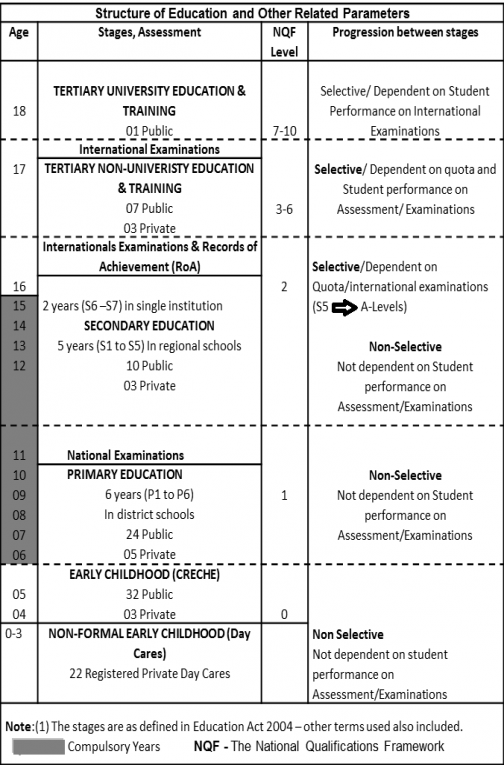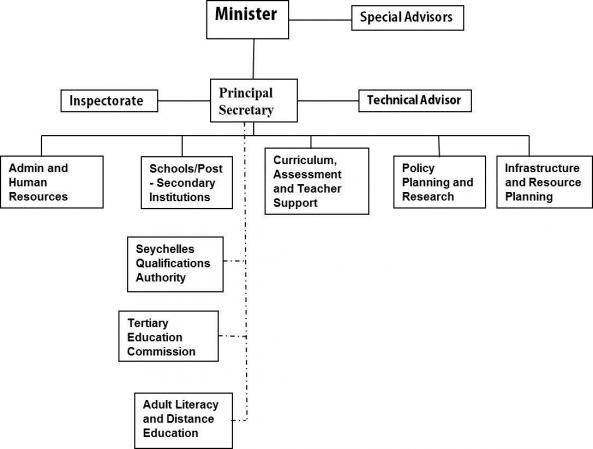Education Fact Sheet
Minister of Education: Hon. Mrs Macsuzy Mondon
Education system/structure of education
Prior to the 1980s, the education system in the Seychelles was characterised by a combination of grammar and modern secondary schools, inherited from England. Following a number of adjustments and reforms, the education and training system presently in place share the following characteristics:
- a comprehensive, integrated, inclusive and co-educational education and training system offered at the following five defined stages of Education Act (2004) - formal early childhood education (also referred as crèche) primary education, secondary education, post- secondary or non- university tertiary education and training, and tertiary education.
- a system which accommodates both compulsory/non-compulsory and fee-paying/non fee paying dimensions of the service, and which is predominantly under the responsibility of the State and is supplemented by private initiatives at all levels from early childhood to tertiary education4.
- a system which provides for education from Early Childhood to Secondary free of direct charge at –point-of-use to all Seychellois children for a period of thirteen (13) years (nominally from 3+ to 16+ years of age) and makes available tertiary education and training opportunities through cost-sharing mechanisms to all Seychellois who meet the selection criteria appropriate to particular course of study or training for which a learner qualifies.
- A system which provides ten (10) years of compulsory education from primary one to Secondary Four
- A system which makes for learners who at the end of compulsory education (secondary 4) wishes not to continue secondary education beyond secondary 4 to either continue their education and training at the level of tertiary institutions should they meet the entry criteria for relevant courses offered by these institutions or dis-continue secondary education and seek employment3.
- A system which as of 2012 is governed by two legal frameworks, Education Act (2004) and Tertiary Education Act (2011).
The structure of the Seychelles’ education is depicted by the diagram below.

Management of Education
The management structure of the Ministry of the last five years, has been greatly influenced by the Memorandum of Action of the Public Administration and Public Sector Reform Programme (2009) which required line Ministries to focus on:
- Formulation of policies and guidelines within their respective sectors.
- Provide technical supervision, set standards and inspect services to ensure appropriate quality.
- Monitor and evaluate implementation and ascertain efficiency of delivery of services.
- Provide for a variety of administrative, personnel and logistical support to its executive agencies.
The following organigram gives an overview of the structure of the Ministry of Education:

Roles of Stakeholders in Education
The Education Sector Medium Term Strategic Plan (MTS) 2013-2017 is a newly conceived, comprehensive, and balanced education sector programme which recognises the effective collaboration between key stakeholders in order for the Ministry of Education to deliver high quality education to all. The successful implementation of the plan will thus be characterized by:
- Strong government commitment and leadership
- Effective communication
- Coherent synchronized, coordinated timely and sustained external support
- Strengthened financial and procurement management procedures
The roles of different key stakeholders are briefly outlined follow:
Cabinet of Ministers
- Maintain overall oversight and monitoring of the contribution of education and training sector.
Ministry for Education
- Responsible for the successful, timely and effective development and implementation of Medium Term Strategy 2013-2017.
Ministry of Finance
- In close consultation with the Ministry for Education, secure funds to ensure adequate financing of the Programmes of the Sector Medium Term Strategic Plan.
- Monitor, advise and assist in the procurement and disbursement of funds.
- Directors of Other Education Sector Agencies/Bodies
- Responsible for ensuring that the Strategic Plan Programmes/components that fall under their mandate and responsibilities are implemented.
Ministry of Foreign Affairs/International Partners
- To provide oversight at Cooperation Level
- To make recommendations on the process
Other Ministries and Governmental Bodies
- Providing inputs at national policy level.
Civil Society, Non-State Education and Other relevant Contributions
- Providing technical inputs through policy reviews and analyses
- Translating policies into priority areas and objectives
Parents and the wider community
- Providing an enabling environment and the support necessary for the holistic development of the child or young adult.
